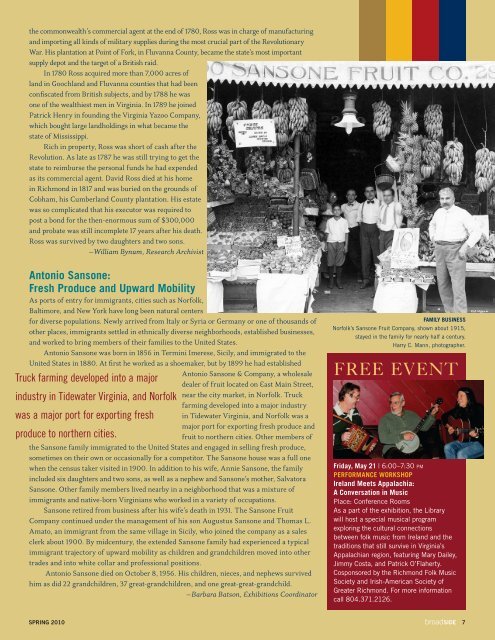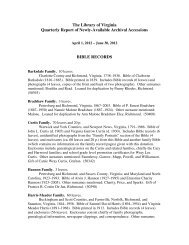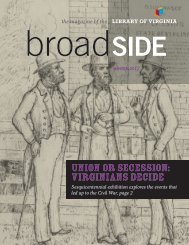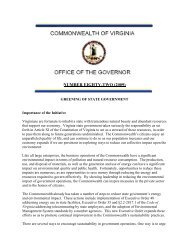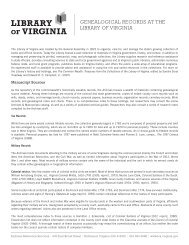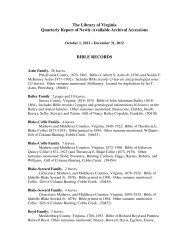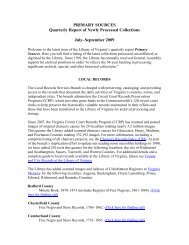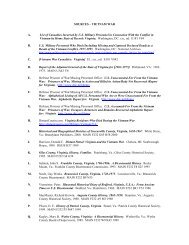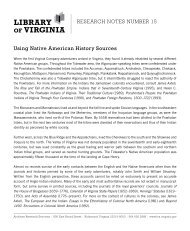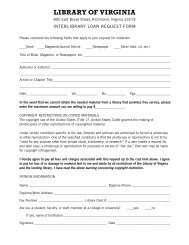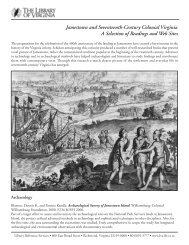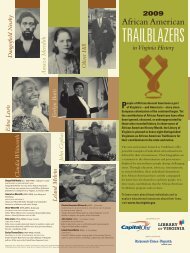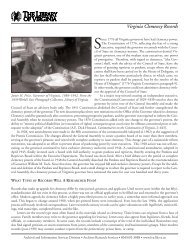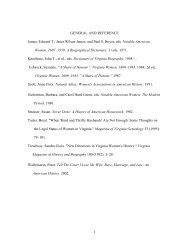the magazine of the - Library of Virginia
the magazine of the - Library of Virginia
the magazine of the - Library of Virginia
You also want an ePaper? Increase the reach of your titles
YUMPU automatically turns print PDFs into web optimized ePapers that Google loves.
<strong>the</strong> commonwealth’s commercial agent at <strong>the</strong> end <strong>of</strong> 1780, Ross was in charge <strong>of</strong> manufacturing<br />
and importing all kinds <strong>of</strong> military supplies during <strong>the</strong> most crucial part <strong>of</strong> <strong>the</strong> Revolutionary<br />
War. His plantation at Point <strong>of</strong> Fork, in Fluvanna County, became <strong>the</strong> state’s most important<br />
supply depot and <strong>the</strong> target <strong>of</strong> a British raid.<br />
In 1780 Ross acquired more than 7,000 acres <strong>of</strong><br />
land in Goochland and Fluvanna counties that had been<br />
confiscated from British subjects, and by 1788 he was<br />
one <strong>of</strong> <strong>the</strong> wealthiest men in <strong>Virginia</strong>. In 1789 he joined<br />
Patrick Henry in founding <strong>the</strong> <strong>Virginia</strong> Yazoo Company,<br />
which bought large landholdings in what became <strong>the</strong><br />
state <strong>of</strong> Mississippi.<br />
Rich in property, Ross was short <strong>of</strong> cash after <strong>the</strong><br />
Revolution. As late as 1787 he was still trying to get <strong>the</strong><br />
state to reimburse <strong>the</strong> personal funds he had expended<br />
as its commercial agent. David Ross died at his home<br />
in Richmond in 1817 and was buried on <strong>the</strong> grounds <strong>of</strong><br />
Cobham, his Cumberland County plantation. His estate<br />
was so complicated that his executor was required to<br />
post a bond for <strong>the</strong> <strong>the</strong>n-enormous sum <strong>of</strong> $300,000<br />
and probate was still incomplete 17 years after his death.<br />
Ross was survived by two daughters and two sons.<br />
—William Bynum, Research Archivist<br />
Antonio Sansone:<br />
Fresh Produce and Upward Mobility<br />
As ports <strong>of</strong> entry for immigrants, cities such as Norfolk,<br />
Baltimore, and New York have long been natural centers<br />
for diverse populations. Newly arrived from Italy or Syria or Germany or one <strong>of</strong> thousands <strong>of</strong><br />
o<strong>the</strong>r places, immigrants settled in ethnically diverse neighborhoods, established businesses,<br />
and worked to bring members <strong>of</strong> <strong>the</strong>ir families to <strong>the</strong> United States.<br />
Antonio Sansone was born in 1856 in Termini Imerese, Sicily, and immigrated to <strong>the</strong><br />
United States in 1880. At first he worked as a shoemaker, but by 1899 he had established<br />
Antonio Sansone & Company, a wholesale<br />
dealer <strong>of</strong> fruit located on East Main Street,<br />
near <strong>the</strong> city market, in Norfolk. Truck<br />
farming developed into a major industry<br />
in Tidewater <strong>Virginia</strong>, and Norfolk was a<br />
major port for exporting fresh produce and<br />
fruit to nor<strong>the</strong>rn cities. O<strong>the</strong>r members <strong>of</strong><br />
<strong>the</strong> Sansone family immigrated to <strong>the</strong> United States and engaged in selling fresh produce,<br />
sometimes on <strong>the</strong>ir own or occasionally for a competitor. The Sansone house was a full one<br />
when <strong>the</strong> census taker visited in 1900. In addition to his wife, Annie Sansone, <strong>the</strong> family<br />
included six daughters and two sons, as well as a nephew and Sansone’s mo<strong>the</strong>r, Salvatora<br />
Sansone. O<strong>the</strong>r family members lived nearby in a neighborhood that was a mixture <strong>of</strong><br />
immigrants and native-born <strong>Virginia</strong>ns who worked in a variety <strong>of</strong> occupations.<br />
Sansone retired from business after his wife’s death in 1931. The Sansone Fruit<br />
Company continued under <strong>the</strong> management <strong>of</strong> his son Augustus Sansone and Thomas L.<br />
Amato, an immigrant from <strong>the</strong> same village in Sicily, who joined <strong>the</strong> company as a sales<br />
clerk about 1900. By midcentury, <strong>the</strong> extended Sansone family had experienced a typical<br />
immigrant trajectory <strong>of</strong> upward mobility as children and grandchildren moved into o<strong>the</strong>r<br />
trades and into white collar and pr<strong>of</strong>essional positions.<br />
Antonio Sansone died on October 8, 1956. His children, nieces, and nephews survived<br />
him as did 22 grandchildren, 37 great-grandchildren, and one great-great-grandchild.<br />
—Barbara Batson, Exhibitions Coordinator<br />
Truck farming developed into a major<br />
industry in Tidewater <strong>Virginia</strong>, and Norfolk<br />
was a major port for exporting fresh<br />
produce to nor<strong>the</strong>rn cities.<br />
FAMILY BUSINESS<br />
Norfolk’s Sansone Fruit Company, shown about 1915,<br />
stayed in <strong>the</strong> family for nearly half a century.<br />
Harry C. Mann, photographer.<br />
FREE EVENT<br />
Friday, May 21 | 6:00–7:30 pm<br />
PERFORMANCE WORKSHOP<br />
Ireland Meets Appalachia:<br />
A Conversation in Music<br />
Place: Conference Rooms<br />
As a part <strong>of</strong> <strong>the</strong> exhibition, <strong>the</strong> <strong>Library</strong><br />
will host a special musical program<br />
exploring <strong>the</strong> cultural connections<br />
between folk music from Ireland and <strong>the</strong><br />
traditions that still survive in <strong>Virginia</strong>’s<br />
Appalachian region, featuring Mary Dailey,<br />
Jimmy Costa, and Patrick O’Flaherty.<br />
Cosponsored by <strong>the</strong> Richmond Folk Music<br />
Society and Irish-American Society <strong>of</strong><br />
Greater Richmond. For more information<br />
call 804.371.2126.<br />
SPRING 2010 broadSIDE 7


